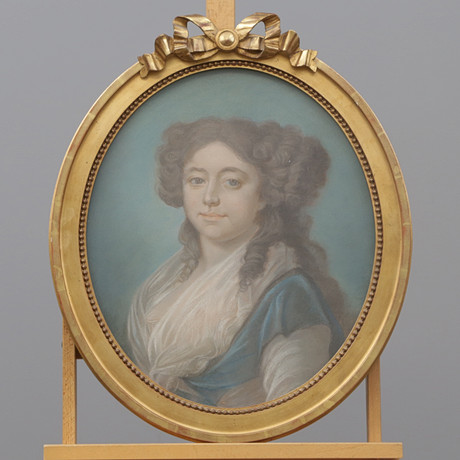
BERTIL LUNDGREN (1900-1979). Button lover, pastel chalk on paper, signed and dated -60.
This auction is closed, but maybe you like the following items?

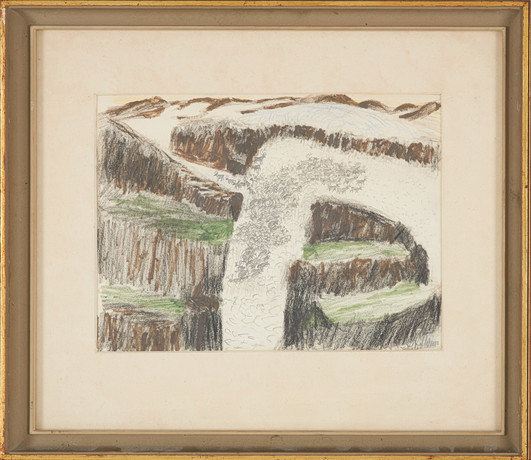
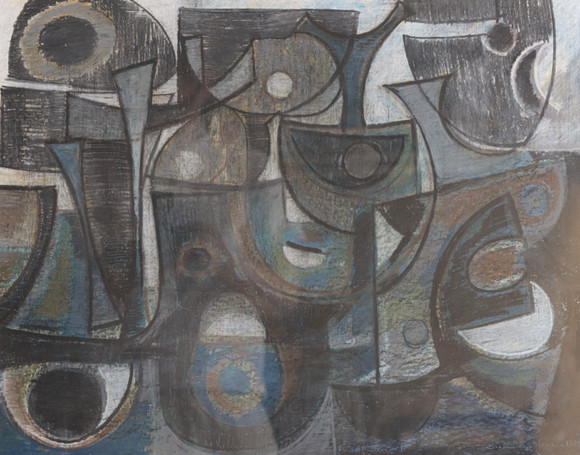
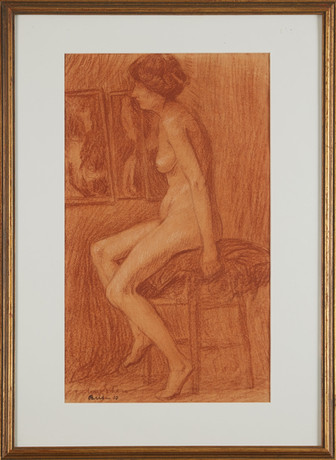
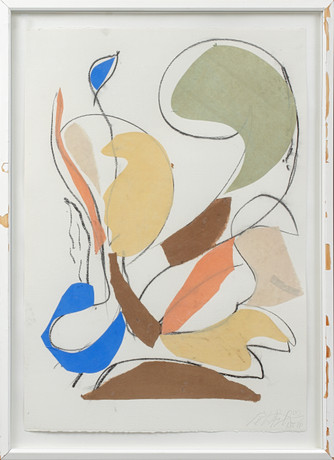
Description
33x40 cm incl. frame.
Provenance:
Ryno and Rolf Lundgren
Other:
Bertil Lundgren — Summer as a motif
There are works of art that, over time, appear increasingly essential — not in spite of its peripheral position, but because of it. Bertil Lundgren (1900—1979) was one such painter. Outside the crowd-courting circles of the central arts scene, he operated with tenacity and integrity. The result was an artistry that, in retrospect, seems both cohesive and wayward.
Lundgren's subject world is geographically concentrated: the harbour areas of Nynäshamn, the coasts of Öland, the Swedish landscape meeting between sea, forest and light. He often sought out places such as Lövhagen, Järflotta and Torö — places where nature speaks softly but clearly, and where the changes of light become particularly noticeable. But in these recurring environments there is nothing routine or decorative. Rather, he allows the motifs to pass through a kind of lyrical filter, in which color, rather than form, is allowed to act the supporting structure. It is a painting reminiscent of Gothenburg Colourism in its richness, but with clearer outlines.
Technically, Lundgren moved between oil, watercolor, chalk and graphics, but regardless of the medium, the role of color remained central. It was never just surface, but substance, perhaps as a way of bringing the rendered closer. There is in Lundgren's work a quiet but consistent effort to record the movements of light, the shifts of the landscape, the moods of the seasons. His artistic association was limited but significant. He was particularly close to Fritz Holmer and Viktor Tesser, who, like Lundgren, experimented with colour, and who together formed a kind of unofficial circle representing the landscapes facing the Baltic Sea.
Lundgren's participation in jury-judged exhibitions during the 1940s, including at C.M. Holmquist in Stockholm, shows that he was not completely invisible in his time. But the ambition never seems to have been public positioning. A larger solo exhibition was planned for Galleri 44 in 1976, but was never realised after the gallerist quickly passed away. Shortly afterwards, Lundgren also passed away, as if something in him had fallen silent as the dream of a retrospective fell away.
The memorial exhibition curated by the sons Orvad, Ove, Rolf and Ryno, in what later became Nynäshamns Savings Bank, became — albeit low-key — an important landmark. It confirmed what many had already assumed: that here was an artistry that deserved not only to be highlighted, but also to be revisited — again and again. Bertil Lundgren did not paint for the present, let alone for the market. He painted for the eye, for the light, for a special kind of closeness to nature.
/Frederick Anthony.
Condition
No remarks.
Resale right
Do you have something similar to sell? Get your items valued free of charge!
Bidding
Have your item valued free of charge.
Bid history
| 1 | 20 Jul, 06:30 | 27 EUR |
Description
33x40 cm incl. frame.
Provenance:
Ryno and Rolf Lundgren
Other:
Bertil Lundgren — Summer as a motif
There are works of art that, over time, appear increasingly essential — not in spite of its peripheral position, but because of it. Bertil Lundgren (1900—1979) was one such painter. Outside the crowd-courting circles of the central arts scene, he operated with tenacity and integrity. The result was an artistry that, in retrospect, seems both cohesive and wayward.
Lundgren's subject world is geographically concentrated: the harbour areas of Nynäshamn, the coasts of Öland, the Swedish landscape meeting between sea, forest and light. He often sought out places such as Lövhagen, Järflotta and Torö — places where nature speaks softly but clearly, and where the changes of light become particularly noticeable. But in these recurring environments there is nothing routine or decorative. Rather, he allows the motifs to pass through a kind of lyrical filter, in which color, rather than form, is allowed to act the supporting structure. It is a painting reminiscent of Gothenburg Colourism in its richness, but with clearer outlines.
Technically, Lundgren moved between oil, watercolor, chalk and graphics, but regardless of the medium, the role of color remained central. It was never just surface, but substance, perhaps as a way of bringing the rendered closer. There is in Lundgren's work a quiet but consistent effort to record the movements of light, the shifts of the landscape, the moods of the seasons. His artistic association was limited but significant. He was particularly close to Fritz Holmer and Viktor Tesser, who, like Lundgren, experimented with colour, and who together formed a kind of unofficial circle representing the landscapes facing the Baltic Sea.
Lundgren's participation in jury-judged exhibitions during the 1940s, including at C.M. Holmquist in Stockholm, shows that he was not completely invisible in his time. But the ambition never seems to have been public positioning. A larger solo exhibition was planned for Galleri 44 in 1976, but was never realised after the gallerist quickly passed away. Shortly afterwards, Lundgren also passed away, as if something in him had fallen silent as the dream of a retrospective fell away.
The memorial exhibition curated by the sons Orvad, Ove, Rolf and Ryno, in what later became Nynäshamns Savings Bank, became — albeit low-key — an important landmark. It confirmed what many had already assumed: that here was an artistry that deserved not only to be highlighted, but also to be revisited — again and again. Bertil Lundgren did not paint for the present, let alone for the market. He painted for the eye, for the light, for a special kind of closeness to nature.
/Frederick Anthony.
Condition
No remarks.
Resale right
Do you have something similar to sell? Get your items valued free of charge!
Payment options for this item
Payment cards
Delivery
: Provide your locationInfo temporarily unavailableLoading…Provide your location to see transport options and prices.
Oops! Something went wrong.
Please try again in a moment. If it still doesn't work, contact support.




